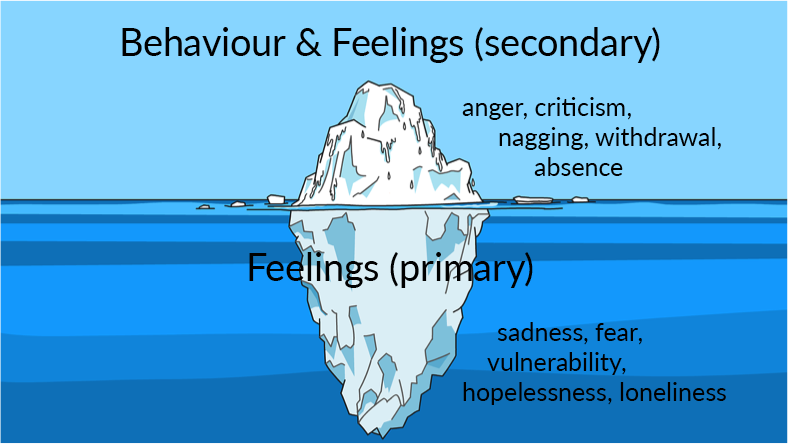The experience of being in ‘lockdown’ is tough on relationships. Even the most loved-up couple is likely to find the experience of being up close and personal 24⁄7 with a partner somewhat stressful. As humans we’re created for connection, but we are neither used to, nor designed, to live our lives only relating (in person) with just our partner. Fault lines that may have always been there may now widen. As soon as lockdown was announced refuge and domestic violence charities predicted an increase of partner violence, and sadly their predictions have proved only too correct.
We have all lost different things in this crisis — financial security, jobs, freedom, holidays or experiences we won’t get back, the ability to see people we love. Of course the sad reality is that some of us will also experience grief over the death of a friend or family member to Covid-19. Although many of our losses are temporary they are losses nonetheless and they have an ongoing impact on us.
There are many (far more qualified) people talking about how the global pandemic is impacting our stress levels and our normal coping mechanisms. The brilliant article by grief expert, David Kessler in the Harvard Business Review is definitely worth a read.
In addition to our losses the pervasive threat of the virus means that, brain-wise, our amygdala is in charge and this puts us in perpetual fight/flight or freeze mode. We are all on hyper-alert, for some of us this makes us withdrawn and quiet for others of us it makes us aggressive and snappy. All of us may find ourselves doing odd things — my husband has flooded the bathroom two days in a row simply because he forgot he’d started running a bath. After the Brexit vote (remember that!) I forgot to collect cash at cashpoint machine three times in a row because my mind was churning about what had happened. So we are none of us at our best right now.
Is your partner more snappy / sensitive / irritating / controlling / elusive / stupidly positive? Probably, and so are you.
At times of stress and difficulty we need our partners to be a ‘safe haven’ for us, by which we mean someone we can come to when life is scary and tough who will comfort us, protect us and help us make sense of what we’re feeling. But it’s hard to be a safe haven for someone when you are also in need of help and understanding. In moments like this we need to take a step back and see the pattern and our part in it. When I am stressed and worried I withdraw into myself, I become fairly inaccessible – I say I’m fine, but I’m not. It’s very hard for me to acknowledge struggle, difficulty and big emotions in ‘real time’. Conversely when my partner is stressed he becomes angry – everything is said with a ‘tone’ and my withdrawal makes him more determined to ‘talk it all through’. You can see that this isn’t hugely helpful to either of us and it can leave us both feeling alone and unable to turn to the other for help. Feelings of aloneness are toxic to relationships. We were created for connection not separation. So we need to try and get out of these spirals, and fast. In order to do this we need to be able to take a step back, recognise that this is indeed a pattern (or ‘dance’ to use Dr Sue Johnson’s language in Hold Me Tight) and to own our own moves in it.
One image that I find helpful in thinking about this is this behaviour/feelings iceberg.

All too often we focus on the top of the iceberg, we look at our partner’s behaviour and ‘secondary’ feelings (snappy, controlling, refusing to engage, absent) and miss everything that’s going on underneath — the sadness, fear, vulnerability that’s huge and unseen. So we are both left to feel this sadness, fear and vulnerability alone. I’ll say it again because it’s so important, — feelings of aloneness are toxic to relationships. So we need to be brave, to be honest and to be vulnerable with one another. We need to be prepared to own missteps and to try and look underneath our partner’s immediate behaviour and surface emotions and to provide help and comfort to one another.
These kinds of conversations are life-giving to relationships and if you are able to have them on a regular basis not only will your relationship survive lockdown you might even find that you come out closer, stronger and more loved up than you went in.
REFLECT & CONNECT
Here are four questions to think about. It can be good to answer them individually, then come together and talk about them. If one of your tends to be more withdrawn and silent, it’s a good idea for them to be really brave and go first!
- How do I behave when I feel stressed or disconnected?
- How do you respond?
- What am I feeling underneath?
- What do I really need from you in those times?
How do you feel when you’re talking about your inner thoughts and feelings? Open and honest, deeper communication can be hard at times because we feel vulnerable. Several couples share their stories and talk about what’s helped them be more open about their emotions in Toucan’s Communication Module.
RELATED ARTICLES:
What to do when your partner’s annoying habits are getting on your nerves during lockdown
9 ways to make co-parenting successful during lockdown


